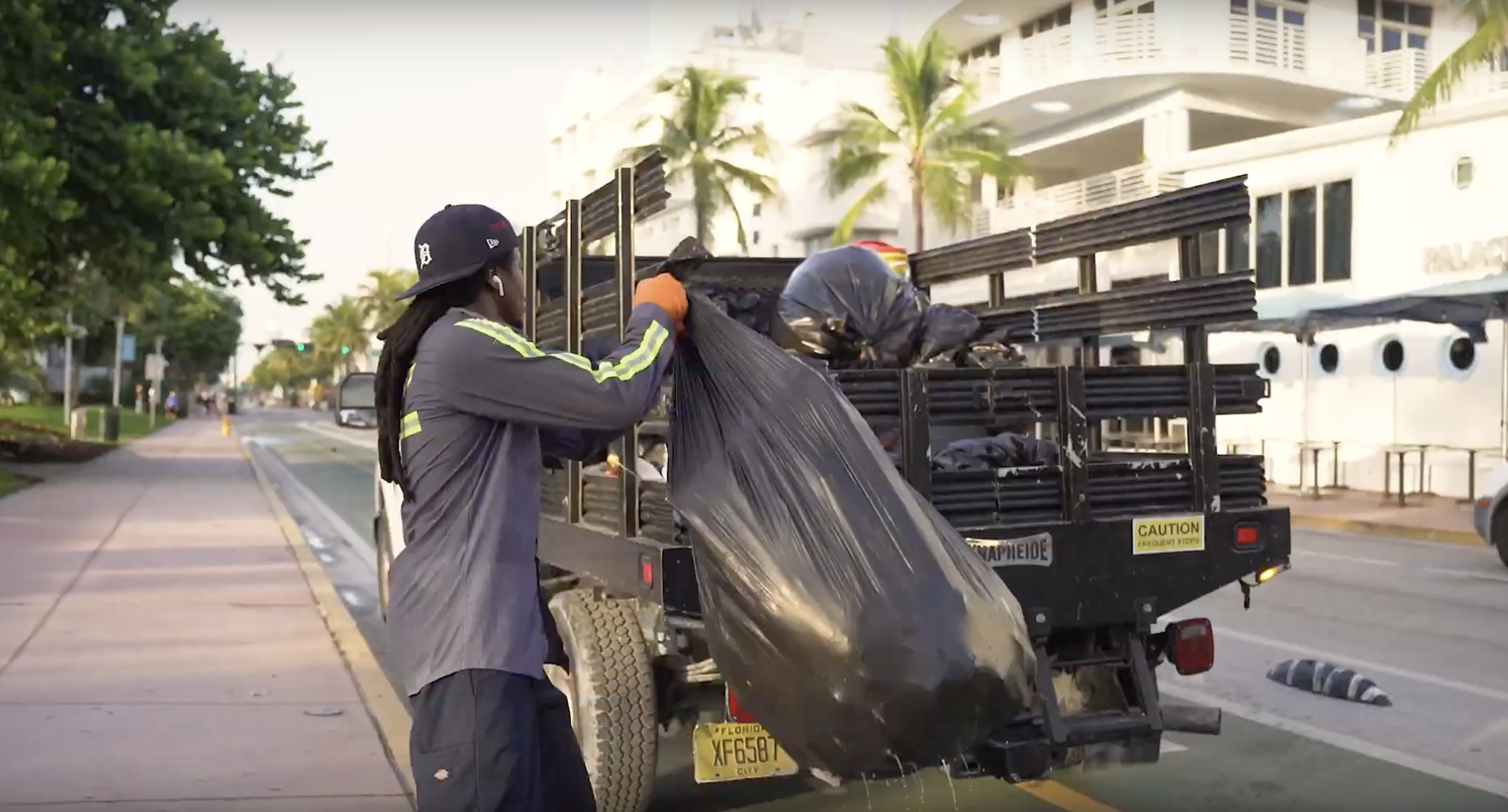Miami Beach Mulls “Well-Fitted” Uniforms for Garbage Collection Workers
Miami Beach Commissioner David Suarez referred a proposal to the city’s Finance and Economic Resiliency Committee this week to explore funding fitted uniforms and reimbursing tailoring expenses for staff who work on Miami Beach’s streets, namely employees in the sanitation, code enforcement, and parking departments.
In the proposal, Suarez says “properly fitted” clothes will make staff more comfortable, promote employee pride, and prevent overheating in the South Florida humidity.
“Well-fitting uniforms project a sense of professionalism and make employees feel more confident when performing their duties,” Suarez wrote. “A professional image also conveys a sense of competency that will allow for better interactions with residents and visitors. Loose clothing articles can get caught in machinery and tight pants can restrict movement.”
To some residents, the item isn’t as innocuous as it may seem. The commissioner’s critics are questioning why, in a city grappling with flooding, traffic gridlock, and an affordable housing crisis, he wants to spend time and resources on custom-fit clothes for staff.
Melba Pearson, a civil rights and criminal law attorney who lives in Miami Beach, tells New Times the measure could play into racially charged tropes about Black workers.
“Why are you picking on what sanitation and code enforcement folks are wearing, especially when we look at the stats and see the majority of people that work in those roles are people of color?” Pearson asks. “Why are we again trying to police what Black people wear? This is not the ’20s. It’s not the ’30s. It’s not even the ’60s. This is the year of our Lord 2024.”
Records obtained by New Times show that 67 percent of Miami Beach sanitation workers, 30 percent of code enforcement employees, and 35 percent of parking department staffers are Black.
“As long as these men perform their job appropriately, the size of their pants should not be a commissioner’s business,” adds Ariana Reguant, a Miami Beach resident and Florida International University-affiliated anthropologist.
Suarez tells New Times via email that there is a “lot of misinformation being spread regarding his benign item.” He says his intention is to give workers an opportunity to tailor their clothing to their size at no cost if they choose to.
He says the cacophony of criticism has unfairly tried to inject a racial element into the proposal.
“No one will be required to wear an outfit a certain way if they are not comfortable with it.”
tweet this
“I have seen many of our front-line workers in sanitation, code, parking, have uniforms on that seem to not fit them appropriately. Pants might be too long, shirt might be three sizes bigger,” he said. “Our city’s front-line workforce should have the opportunity to have uniforms that are tailored to them. No one will be required to wear an outfit a certain way if they are not comfortable with it.”
The commissioner, who is Hispanic, says he is offended by the “race-baiting insinuations.”
For Pearson, the proposal should be seen in the context of the city’s troubled history of segregation and racism. In recent years, Miami Beach has faced criticism for how it prepares for the influx of Black visitors during spring break festivities in March, as crackdowns on Black partygoers have brought the city’s racist history back to the forefront for many Black leaders.
“It’s in the backdrop of all of this,” Pearson says.
The attorney claims Miami Beach’s uniform proposal is reminiscent of “saggy pants” bans, the controversial ordinances that instituted fines and even harsher penalties for people wearing pants with exposed underwear. The laws, which were criticized for targeting people of color, have been repealed in many places across the country. In 2020, the City of Opa-locka repealed its 13-year-old ban in the wake of the murder of George Floyd and the mass protests against police brutality that followed.
Suarez maintains he’s not aiming to police what workers wear. The item is meant to give employees more options to feel comfortable on the job, he says.
“My item isn’t targeting a certain race or skin color of our employees. This item simply provides an option to tailor uniforms to their unique physique,” he says.
Reguant and Pearson note the sanitation department’s work is widely praised. The city recently posted a video on its social media applauding the employees for their work.
“So we go from commending them to wanting to criticize what they are wearing?” Pearson asks.
Delroy Ireland, a sanitation department employee and president of the American Federation of State, County, and Municipal Employees (AFSCME) Local 1554, tells New Times he was not immediately reading a racial element into the proposal, but he’s wary the item would impede workers’ ability to choose loose-fitting clothes for comfort.
Ireland says the sanitation department’s work requires flexible clothing so employees can easily bend and pick up items.
“We need to be comfortable,” he says. “We are in the field sometimes. We’re going to have to be on our knees. We’re going to be getting dirty. We don’t need super tight-fitting clothes.”



